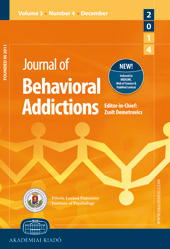Relationships Between Problem-Gambling Severity and Psychopathology as Moderated by Income
Relationships Between Problem-Gambling Severity and Psychopathology as Moderated by Income
Author(s): Rachel L. Sanacora, Seth W. Whiting, Corey E. Pilver, Rani A. Hoff, Marc N. PotenzaSubject(s): Behaviorism, Psychoanalysis, Substance abuse and addiction, Socio-Economic Research
Published by: Akadémiai Kiadó
Keywords: income; problem gambling; psychiatric disorders; psychopathology; NESARC;
Summary/Abstract: Problem and pathological gambling have been associated with elevated rates of both Axis-I and Axis-II psychiatric disorders. Although both problem gambling and psychiatric disorders have been reported as being more prevalent among lower income vs. middle/higher income groups, how income might moderate the relationship between problem-gambling severity and psychopathology is incompletely understood. To examine the associations between problem-gambling severity and psychopathology in lower income and middle/higher income groups. Methods: Data from the first wave of the National Epidemiologic Survey on Alcohol and Related Conditions (NESARC) (n = 43,093) were analyzed in adjusted logistic regression models to investigate the relationships between problem-gambling severity and psychiatric disorders within and across income groups. Results: Greater problem gambling severity was associated with increased odds of multiple psychiatric disorders for both lower income and middle/higher income groups. Income moderated the association between problem/pathological gambling and alcohol abuse/dependence, with a stronger association seen among middle/higher income respondents than among lower income respondents. Discussion and conclusions: The findings that problem-gambling severity is related to psychopathology across income groups suggest a need for public health initiatives across social strata to reduce the impact that problem/pathological gambling may have in relation to psychopathology. Middle/higher income populations, perhaps owing to the availability of more “disposable income,” may be at greater risk for co-occurring gambling and alcohol-use psychopathology and may benefit preferentially from interventions targeting both gambling and alcohol use.
Journal: Journal of Behavioral Addictions
- Issue Year: 5/2016
- Issue No: 3
- Page Range: 429-438
- Page Count: 10
- Language: English

